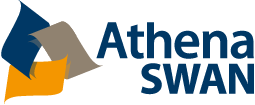Athena Swan

Manchester’s Athena Swan Bronze Award, received in 2008 and renewed in 2011, 2014 and 2018, demonstrates our ongoing commitment to the advancement of gender equality: representation, progression and success for all.
There are three levels of Athena Swan awards:
- Bronze – planning
- Silver – doing
- Gold – sustaining
We are committed to demonstrating a real culture change within the University and our individual Schools and Departments. Our Schools and Departments holding Athena Swan awards include:
- Bronze Award: the Alliance Manchester Business School; the Department of Chemical Engineering; the Department of Computer Science; the School of Environment, Education and Development; the Department of Mechanical, Aerospace and Civil Engineering; and the School of Social Sciences.
- Silver Award: the School of Biological Sciences; the School of Health Sciences; the School of Medical Sciences; and the School of Natural Sciences.
- Prior to the restructure that created the Faculty of Science and Engineering in August 2019, all of the former Schools that are now Departments within the School of Natural Sciences held Athena Swan awards. These included Bronze awards for the Schools of Earth and Environmental Sciences and Mathematics, and Silver awards for the Schools of Chemistry, Materials, and Physics and Astronomy. The School of Engineering was also created through the restructure and is applying for its Athena Swan award.
The Athena Swan Charter was established by the Equality Challenge Unit, now called Advance HE, in 2005 to encourage and recognise commitment to advancing the careers of women in STEMM employment in higher education and research.
In May 2015 the charter was expanded to recognise work undertaken in arts, humanities, social sciences, business and law (AHSSBL), and in professional and support roles, and for trans staff and students. The charter now recognises work undertaken to address gender equality more broadly, and not just barriers to progression that affect women.
Examples of good practice recognised by the Athena Swan Charter include:
- creating an effective workload model for staff that takes into consideration their diverse responsibilities; and
- positive steps towards flexible working, career breaks and parental policy.
In practice this may translate into actions such as:
- the active scheduling of meetings between the hours of 10am and 3pm;
- addressing unconscious bias during interview selection procedures; and
- mentoring of staff, from researchers to professors, to allow progression of careers and to ensure equal opportunities are available to all.
Our commitment to the principles of the Athena Swan Charter, joined with the growing acknowledgement of the award by research councils, will ensure a diverse and vibrant working environment for staff and students.
